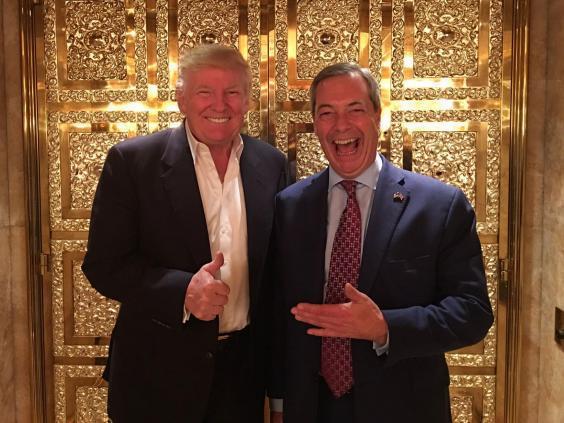The biggest loser from Donald Trump's presidency won't be Ukraine, it will be the UK
There was a time when the Brexiteers sought to offer reassurance by stressing that the “special relationship” with Washington would come back into its own. How does such comfort look now?


Very soon after Donald Trump was elected, a consensus formed about likely winners and losers abroad. According to this, the big winner would be Russia, given that one of Trump’s few consistencies through the campaign was his desire to mend fences with Vladimir Putin. And the biggest loser, it was thought – for similar reasons – would be Ukraine. Any lingering hopes the Kiev government might have had of more money and sympathy, perhaps even of the weapons President Obama had so wisely denied, were deemed over with Hillary Clinton’s defeat.
That consensus may well be correct. As the weeks have passed, however, it has grown increasingly clear that Donald Trump’s victory has left another, far bigger, far more influential loser than Ukraine.
That loser is us: the UK, Great Britain, the British Isles, or whatever we are calling ourselves at the moment. With every day that goes by we look every more marooned in the mid-Atlantic.
It was easy to dismiss the false starts with the new US regime as mere pantomime: the late phone call from the President in waiting; the feting of Nigel Farage at Trump Tower; the faux-recommendation of said Farage as ambassador; the invitation to Theresa May to step by if she ever happened to be passing. These could be explained away variously as the missteps of a novice leader and the self-promotion of Ukip’s outgoing flag-carrier. They meant little in the greater sum of things.
A case could also be made that there were missteps from London, too, on the part of another novice leader – the Prime Minister – and her even more novice Foreign Secretary, Boris Johnson. It hardly adds to the credibility of a government, even the government of a country known among its detractors as perfidious Albion, to be heard speaking so loudly and so often with forked tongue.
What might reasonably be dismissed as diplomatic teething troubles, though, have masked something more profound. If the UK felt ambivalent about Barack Obama – the displaced Churchill bust in the Oval Office, his seemingly casual disregard of the “special relationship”, his “pivot" away from Europe and towards Asia – we probably haven’t seen anything yet.
Now that Donald Trump’s foreign policy team is pretty much in place, barring accidents at the confirmation stage, it is possible to draw several conclusions, and they leave London looking very exposed indeed.
First, Trump is serious about changing both the way Washington works and its foreign policy priorities. The number of ex-military men in his line-up does not, as some have suggested, herald the dangerous militarisation of US government, still less is it the harbinger of a Trump “junta”. It is rather evidence that he wants people around him who can get things done, who are as impatient as he with bureaucracy and staid ways of (not) doing things, and who are used to being accountable. These are not people with whom wordy and worthy British officials will necessarily find it easy to get along.
A second observation would be that he remains serious about trying to alter the dynamic with Russia. Witness his choice, after long deliberation, of Rex Tillerson, a former oil man who has had apparently amicable dealings with Putin, as his Secretary of State.
The fact that he gives this so much importance suggests that he sees a better relationship with Russia as the key to much more, including maybe stability in Europe, parts of the Middle East (specifically Syria) and north-east Asia. This will place him at odds with much of the UK’s current foreign policy thinking – as will his limited enthusiasm for extending free trade.
Third, he is prepared (deliberately if naivety) to take on not just vested interests but institutions considered almost sacrosanct. His outright dismissal of the CIA’s “evidence” of Russian interference in the US election, as told to the Washington Post, has made him a significant enemy in the US capital before he has even begun – an enemy, moreover, that sees itself as an arch-defender of US security. This also suggests that he may also more inclined than many believe to act on his misgivings about Nato.
Any fears London and other European capitals may have about the future US administration may not be justified. There are constraints – both desirable and not – even on US presidential power. The changes Trump clearly envisages may not happen, or may happen far more slowly than he expects or hopes. Such radical foreign policy intentions, however, leave US allies in a quandary, and none more so than the UK, the country that sees itself as the closest ally of all.
Isolation is already setting in. On Syria, Obama has essentially moved to accept the survival of Assad, while the UK is left shouting on the sidelines in defence of a transatlantic policy that is already dead.
Something similar is happening over Russia and Ukraine. While the EU has effectively begun a rapprochement with Moscow and solidarity on Ukraine-related sanctions is weakening, the UK remains stuck in its dogmatic rut.
Policy shifts, moreover, will not be easy – in part because we shouted so loudly and gave the impression of fervent belief, but also because we have no real mechanism for change. Where the new US President can claim his electoral mandate in justification, and France and Germany have elections that could help their governments to do the same, the UK (with no election in the offing) has either to execute some embarrassing U-turns or languish ever further out on a limb.
The UK’s predicament is now many times worse because it has dramatically changed policy in one area – Europe – by referendum and, in so doing, left itself without an alternative anchor. There was a time when the Brexiteers sought to offer reassurance by stressing that, post-EU, the “special relationship” with Washington would come back into its own and the UK would continue to be a leading European light in Nato. How does such comfort look now?
The choice looks stark: either to retreat into ever greater isolation or to start reversing some major policies, and fast.
Brexit, alas, makes our adjustment to the Trump era it a good deal more difficult than it would otherwise have been.



Join our commenting forum
Join thought-provoking conversations, follow other Independent readers and see their replies